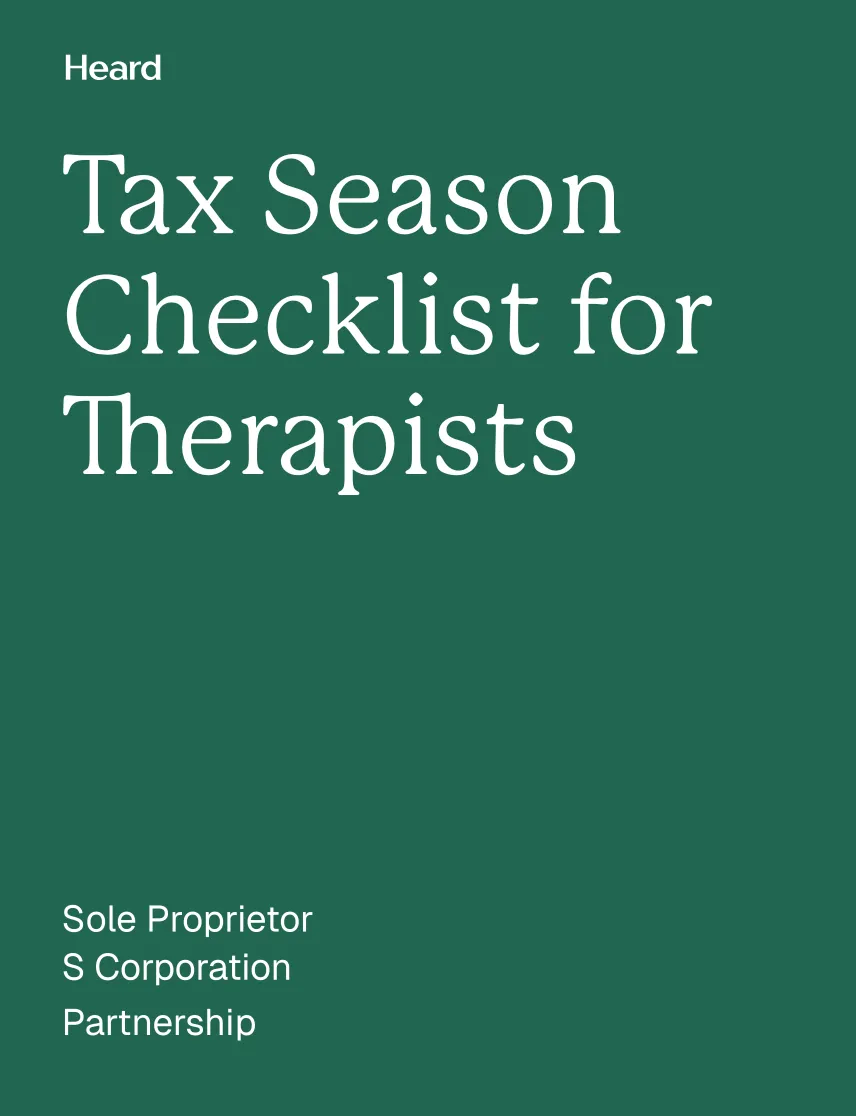If you file and pay your taxes accurately and on time, it’s extremely unlikely you’ll need to worry about IRS penalties.
On the other hand, if you file or pay your taxes late, inaccurately, or—worst of all—not at all, you’re going to get dinged.
Here’s everything you need to know about how IRS penalties may affect your therapy practice, how you can avoid them, and what to do if you can’t afford to pay.
{{resource}}
How to tell the IRS is going to penalize your therapy practice
Some good news: If the IRS is going to penalize you, they’ll be sure to let you know.
When you’re late filing or paying your taxes, the IRS typically doesn’t lose much time sending you a notice in the mail. And, if you have an Electronic Federal Tax Payment System (EFTPS) login, you should be able to see any outstanding amounts you owe.
Heads up: If you get a text, email, or phone call from someone claiming to be the IRS, saying you owe them money, it’s almost certainly a scam. As a first point of contact, the IRS will always send you a letter by mail.
IRS late filing and payment penalties for therapy practices
The delinquency penalties recognized by the IRS are generally separated into three categories:
- Failure to file a timely return
- Failure to pay tax reported on a return
- Failure to pay an assessed tax that should be shown on a return, but which is not
For the purposes of your therapy practice, penalties 1 and 2 are most relevant.
The penalties:
- Failure to file a timely return: Monthly interest of 5% on your unpaid taxes for the year, up to a total of 25% the value of your unpaid taxes. Regardless of how much you owe in taxes, if you are over 60 days late filing, the minimum Failure to File Penalty is $435, or 100% of the tax on the return, whichever is less.
- Failure to pay tax reported on a return: Monthly interest of 0.5% on your unpaid taxes for the year, up to a total of 25%.
When these penalties both apply in the same month, they total a maximum of 5% (rather than 5.5%): your failure to file penalties are reduced to 4.5%, and your failure to pay penalties remain 0.5%.
You may also be charged an underpayment penalty in the event you fail to pay the complete amount owing on your quarterly taxes.
Accuracy related IRS penalties
It’s possible to be charged a penalty for inaccurately filing your taxes, but only if you’re audited.
In the unlikely event you’re audited by the IRS and they discover you filed an inaccurate tax return, either through your own negligence or by significantly understating the amount you owed in taxes, you may be charged a 20% penalty.
The IRS audits just 0.3% of all tax returns. Some business structures, such as sole proprietors, are more likely than others to be audited.
So, think of accurate tax filing as insurance in case of the worst case scenario. One of the best ways to ensure you file accurately is to work with a bookkeeper or an accountant.
How to reduce tax penalties (or avoid them entirely)
Word of advice: the best policy you can follow is to file and pay your taxes accurately and on time each year (or on a quarterly basis, when it comes to quarterly taxes and payroll taxes.)
Doing so will not only save you from the financial cost of IRS penalties, but it will reduce the mental and emotional toll of playing catch-up.
Don’t worry, though. In the event your tax deadline does go whooshing past before you’re ready for it, there are steps you can take to mitigate the damage.
File your taxes even if you can’t pay
As you may already be able to guess based on how they’re penalized, the IRS is more forgiving of late payment (0.5% interest) than late filing (5% interest).
In their eyes, it’s understandable if you’re short on cash. They provide a number of ways to pay your tax bill late (more on that below).
But there’s one thing the IRS just can’t stand, and that’s being left in the dark. They want to know what your business owes in taxes, so they can keep their own books balanced. Whether you’re able to pay immediately is of secondary importance.
So, even if you can’t afford to pay your taxes, or if you’re behind on quarterly payments, file your annual tax return as soon as possible. You’ll lower the amount you pay in penalties by a factor of ten (from 5% monthly to 0.5%).
You’ll also signal to the IRS that you’re eager to follow the rules to the best of your ability. That may work to your benefit later if you need to negotiate a late payment plan.
If possible, file for an extension
If the April tax deadline is looming and you know you aren’t prepared to file on time, file for a tax extension.
A tax extension gives you an extra six months to figure out your revenue and expenses for the year and file your return.
It doesn’t buy you extra time to pay your taxes, however—they’re still due on the deadline, whether that deadline is annual or quarterly. And they’ll still accumulate penalties as long as they go unpaid.
Hire help catching up
One common reason business owners file their taxes late is that they don’t have the information they need in order to file.
An annual profit and loss statement (P&L) tells you how much income to report on your tax return. And a complete set of books for the year provides the information you need to itemize deductions. Neither of these is available if you have no bookkeeping system in place.
Luckily, many bookkeepers offer retroactive services. They can go back, analyze your bank transactions, and create a complete set of books (including financial statements) you can use to file.
If you’re behind on your bookkeeping and tax season is approaching, get in touch with a bookkeeper who has experience working with therapy practices. Or consider using Heard: one of our specialties is helping self-employed therapists catch up on bookkeeping.
{{resource}}
What to do if you can’t afford to pay your taxes
A business that can’t afford to pay its taxes is nothing new to the IRS. The four tax relief options they offer are designed to help you pay your taxes without bankrupting you. Each option may be more or less appropriate, depending on your circumstances.
Before pursuing any tax relief option with the IRS, it’s a good idea to consult with an accountant. They can help you identify the best strategy for your practice.
Penalty abatement
For the 2019 and 2020 tax years, in response to the pandemic, the IRS canceled penalty payments for most individuals and businesses filing late—benefiting about 1.2 million taxpayers.
The IRS also cancels penalties at the individual level. If you can demonstrate that an event beyond your control caused a delay in filing, you may get relief. In order to do so, you’ll need to write a Penalty Abatement letter, explaining the reason for your late filing and requesting tax relief.
In order to follow this route, your tax filings must be up to date.
Short term extension
In many cases, you can qualify for a 120 day extension on tax payments. Unlike other options, you won’t be required to sign a formal contract with the IRS, and you won’t be legally compelled to make any payments before the 120th day of your extension.
To find out whether you qualify, and to file for a short term extension online, visit the IRS payment plan application page.
Offer in compromise
If you’re an employer and you’re up to date with your quarterly tax deposits, you may be able to make an offer in compromise and have it accepted by the IRS.
When you make an offer in compromise, you’re effectively saying to the IRS, “I can’t afford to pay the full amount I owe. Will you accept this instead?”
The IRS will take into account a variety of factors, including your ability to pay, income, and expenses, before making a decision. In general, they will accept an offer in compromise in one of three situations:
- The IRS is unlikely to be able to collect the full amount owing
- There is a legitimate dispute regarding the amount you owe
- Collection of the full amount would cause you economic hardship, or if there are other compelling public policy or equity considerations in play
The IRS offer in compromise pre-qualifier can help you determine whether your offer in compromise is likely to be accepted—although, as always, the final decision is up to the IRS.
Tax installment agreement
You may be able to negotiate a formal installment agreement with the IRS, whereby you pay your tax bill gradually.
To qualify, you should owe less than $50,000 in combined tax, penalties, and interest. You should also be otherwise compliant with tax filing requirements. (Another good reason to file your taxes on time, even if you can’t pay in full.)
While an installment agreement will break your tax debt into bite-size chunks, it won’t save you from penalties. You’ll still accrue interest on all unpaid taxes remaining. Also, if you underpay or fail to pay any of your installments, you’ll technically be in breach of your agreement with the IRS.
Depending on your situation, you may be able to begin the application process for a formal installment agreement on the IRS payment plan application page. Otherwise, you can apply for an installment plan by filing Form 9465.
Currently non-collectible
If you can prove to the IRS that you’re unable to pay both your tax debt and your living expense, they may offer you an extension on the taxes you owe them.
Meaning, while you’ll still owe the IRS taxes, you’ll have longer to pay them. Typically, when you qualify for currently non-collectible status, the IRS will revisit your case on an annual basis to determine whether you’re able to pay.
—
If tax season is approaching, and you don’t have the information you need to file, it’s time to catch up on your bookkeeping. Learn how to catch up on bookkeeping for your therapy practice.
This post is to be used for informational purposes only and does not constitute legal, business, or tax advice. Each person should consult their own attorney, business advisor, or tax advisor with respect to matters referenced in this post.
Bryce Warnes is a West Coast writer specializing in small business finances.
{{cta}}
Manage your bookkeeping, taxes, and payroll—all in one place.

Discover more. Get our newsletter.
Get free articles, guides, and tools developed by our experts to help you understand and manage your private practice finances.
Every quarter, Heard reviews the financial health of your practice, discusses any recommendations, and reminds you of upcoming estimated tax payments. Schedule a free consult to learn more.
Schedule a free consult




